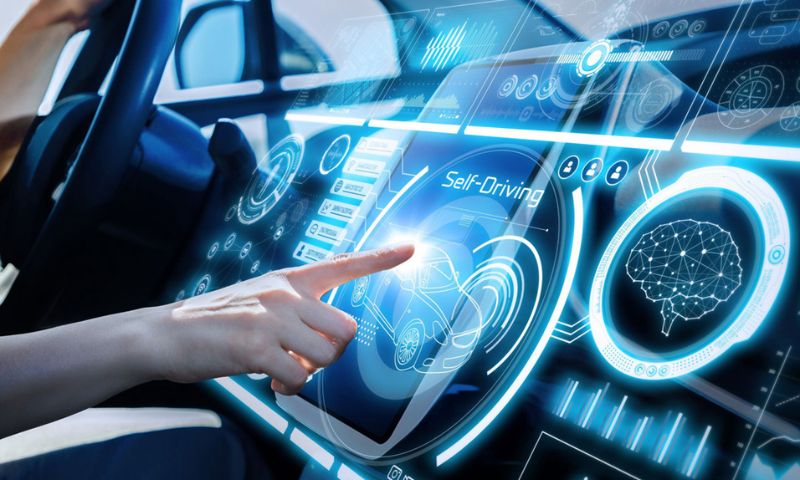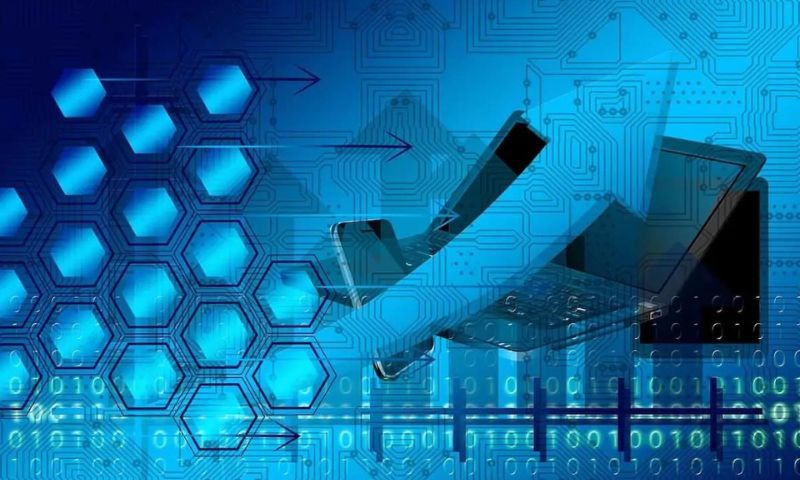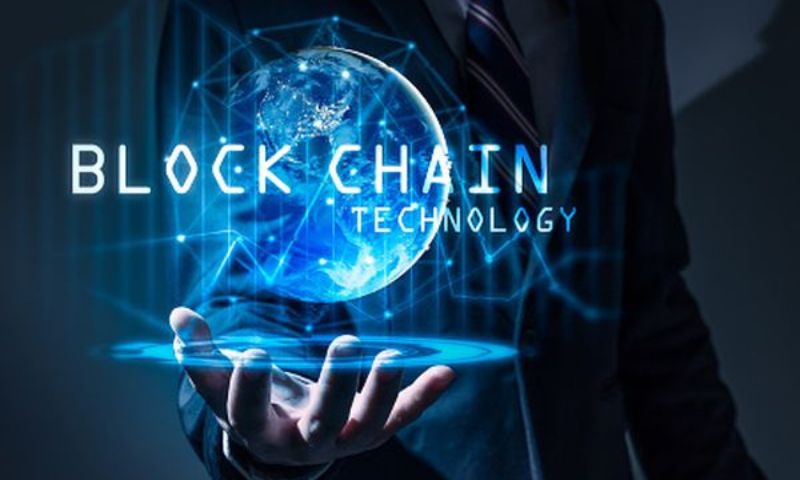The pace at which blockchain is evolving could leave us breathless. We’re on the brink of witnessing specific examples of future blockchain use cases that will redefine industries. Imagine a world where your medical records are impenetrable fortresses, accessible only by those you permit. Where your finances flow across borders with ease, and your assets are as liquid as the tap water from your kitchen. In this post, we’ll unpack eight mind-bending, pioneering use cases for blockchain that are gearing up to revolutionize our tomorrow. Get ready to peer into the future and see how blockchain stands to be the hero we might not have expected but certainly need.
Empowering Healthcare Efficiency with Blockchain
Ensuring Robust Medical Data Security with Blockchain Advances
Keeping medical records safe is a top job for healthcare pros. Blockchain can help. By using this tech, we can protect patient info like never before. It’s like a super-strong lock that keeps data away from hackers.
How does blockchain make medical data more secure? It breaks up info and spreads it out. Hackers can’t get the whole picture. They only find tiny, useless bits. It’s not just good for keeping records safe. It makes sure only the right eyes see them. Doctors, nurses, and patients can check info without worry. They know it’s locked down tight.
Redefining Patient Record Management through Blockchain
Think about how we keep track of medical info now. It’s all over the place. One system here, another there. It’s tough to share and update records. With blockchain, we change the game. It’s like having a secret chat room where all your doctors can talk. They can share updates in real-time.
How does blockchain improve patient record management? It keeps everything in one place, like a library that’s always up-to-date. You don’t need to call your doctor for info; you can look it up yourself. It’s all about giving power back to patients. You get to manage your own health story.
This new way makes things faster and safer. There’s no waiting for files to move around. And with fewer mix-ups, it’s easier to stay healthy. Every check-up, every visit – it’s all there, clear as day.
Using blockchain in healthcare isn’t a small change. It’s a whole new way to keep us healthy and safe. It’s not just smart; it’s caring. And that’s what health is all about.
Innovations in Decentralized Finance and Payment Systems
Revolutionizing Banking with Smart Contract Applications
Smart contracts are a game-changer in banking. These are like digital promises, set in code, that run when certain conditions are met. They cut out the middleman, bringing down costs and saving time. This is how we’re making deals safer and faster. Imagine getting a loan without waiting for days. That’s smart contracts in action.
Now, let’s say you want to save money. With smart contracts, you save without banks. Your money grows and you’re in control. No hidden fees or fine print. This kind of blockchain innovation in healthcare lets doctors and patients handle payments direct, without fuss. Medical data security gets a boost too. With blockchain, only the right eyes see patient records. Think of it as a vault that only opens with the right key.
Facilitating Cross-Border Payments with Blockchain Technology
Next up is sending money across the world. Today, it’s slow and costly. But not for long. Blockchain tech is stepping in, making it cheap and almost instant. Whether it’s a family sending money home or a patient abroad paying for medical services, blockchain makes it a breeze. It’s like an express lane for your money, no matter where it goes.
These cross-border payments blockchain services help people everywhere. They also make sure patient record management is smooth across countries. These systems check that everyone plays by the rules, and all data stays safe.
Each of these steps toward decentralized financial services is big news for our wallets and our well-being. Soon, with just a few taps on your phone, you’ll manage money, pay for a doctor, or send cash abroad. The blockchain train has left the station and there’s no going back. The future looks smart, fast, and secure.
Revolutionizing Asset Management and Ownership
The Future of Real Estate through Tokenization and Blockchain
Picture owning a piece of a skyscraper. Sounds wild, right? But that’s where we’re heading with blockchain. This tech makes owning parts of property, like homes or offices, easy for anyone. We call it real estate tokenization. Imagine slicing a property into shares, like a pizza. Now, instead of buying a whole building, you just buy a slice. It’s smart, efficient, and very practical, especially if you don’t have loads of cash.
This works through blockchain, a trusty digital ledger. Every slice, or “token,” lives on this ledger. It’s secure and transparent. You can see who owns what, no tricks or secrets. Buying and selling get simpler, with smart contracts handling all the tough stuff. This means faster deals with no hassle.
Real estate tokenization opens doors for many to invest. It’s not just for the rich anymore. Students, families, or small investors – everyone gets a shot at the real estate market.
Enhancing Supply Chain Transparency and Product Verification with Blockchain
Ever wonder if what you buy is the real deal? With blockchain, you won’t have to. It’s changing the game in how we track products, from creation to your hands. This is about supply chain transparency and product verification, two big words for a simple idea: You get to know where your stuff comes from.
Blockchain tells you the whole story of a product. Farms, factories, stores – you can see every step. It’s all about trust. No fake goods, just the truth. And it’s not all talk. It’s happening in fashion, food, and more. You’ll know if that jacket is really leather or if your coffee truly comes from where it says.
Smart contracts help here too. They’re like tiny robots in the blockchain that make sure everyone plays by the rules. So when a coffee bean moves from a farmer to a shop, these contracts track it, step by step.
This isn’t a dream for the future. Companies are using it today. They’re building trust, one block at a time. And for you, it means getting what you paid for, every time.
Blockchain is more than just tech talk. It’s a way to make life fairer and deals cleaner. It’s a new path for everyone, from farmers to fashionistas, to share in the economy. Keep your eyes open. This is just the start. And I’m all in, walking this road towards an honest, open future.
Enhancing Public Trust with Blockchain Deployment
Implementing Transparent and Secure Blockchain Voting Systems
Imagine voting from your phone, safe and sound. Imagine no more! With blockchain voting systems on the rise, this is about to get real. Today, we cast votes and trust they’re counted right. But sometimes, we hear about votes lost, miscounted, or even changed. Not good, right?
Blockchain can fix that. It’s like a digital box that keeps all our votes safe. Each vote is a lock that can’t be broken. Once you vote, that’s it. It’s locked in and can’t be changed. Plus, everyone can see the box is full, but can’t tell who voted for who. Smart, right?
Election security gets a big boost here. Digital ledgers, which are lists that blockchain makes and keeps safe, make sure votes stay pure and honest. No one can mess with a vote once it’s in there. This is huge for earning people’s trust again.
Blockchain Applications for Reliable Government Service Delivery
Think about services the government gives you. Sometimes things get slow or messed up. Blockchain can make it better by tracking every step. Like, when you apply for a new passport or pay your taxes, blockchain can keep a trail.
This trail is clear for everyone to see. If a paper is missing or a step is left out, you can spot where it went wrong. Easy fix! Also, your personal info? Super safe. Only you can give access to it thanks to cool tech like encryption. This way, your stuff stays your stuff.
Services get faster and less costly. Blockchain is awake 24/7, so it never takes a break. It doesn’t get tired or need a vacation. And since computers do the work, we don’t need so many papers. Saving trees, too!
In a nutshell, blockchain will change how we trust the system. From your vote to your tax dollar at work, you’ll see every move. It means a system that works for us, clear as day and twice as reliable. And the best part? It’s just around the corner. Get ready for a smooth ride!
In this post, we dove into how blockchain is changing our world. We saw it can make health data safe and change how we keep patient records. Then, we learned how this tech is shaking up banks and making it easier to send money across borders. We also explored how it’s changing the game in owning things, like houses, and making sure products are what they say.
Lastly, we looked at how blockchain can make voting honest and government services more trusty. It’s clear that blockchain is not just tech talk, it’s a tool making things better for everyone. Its ability to secure data and operations, cut out the middleman, and bring transparency can truly be a force for good. Let’s embrace this change and make the most of it!
Q&A :
What are some potential future use cases for blockchain technology?
Blockchain technology has the potential to revolutionize numerous industries with its capacity for secure and decentralized transaction recording. In the future, we might see widespread blockchain applications in supply chain management for enhanced transparency and traceability, in voting systems to prevent fraud and ensure integrity, in real estate for streamlining property transactions, and in the energy sector for peer-to-peer energy trading and renewable energy tracking.
How could blockchain impact the financial industry in the future?
Blockchain stands poised to significantly impact the future of finance by introducing decentralized finance (DeFi) platforms that offer an array of financial services without the need for traditional intermediaries, like banks. Future use cases include cross-border payments with reduced costs and time delays, tokenization of physical assets to improve liquidity, and smart contracts that automatically execute transactions under certain conditions, eliminating manual processing and reducing the likelihood of disputes.
What are the future implications of blockchain in healthcare?
The implications of blockchain in the future of healthcare are profound. Blockchain could enable secure storage and sharing of electronic health records, ensuring patient privacy while providing easy access to authorized individuals. It can also improve the traceability of pharmaceuticals to combat counterfeit drugs, manage the consent for clinical trials more transparently, and facilitate the secure transfer of medical data for research while complying with regulations like HIPAA and GDPR.
Can blockchain technology contribute to sustainability and environmental goals?
Absolutely. Blockchain can enhance sustainability and environmental initiatives by supporting carbon credit trading with better tracking and transparency. The technology could also aid in the verification of sustainable practices and ethical sourcing in supply chains, promoting consumer confidence. Moreover, it could enable transparent and efficient donation tracking for environmental projects, ensuring that the funds reach their intended use.
How will blockchain transform the way we use the Internet in the future?
The future of the Internet could be reshaped by blockchain through the emergence of decentralized internet services, or Web 3.0, where users have greater control over their data. Such applications may range from decentralized social media platforms that provide users with data ownership and prevent censorship, to decentralized marketplaces that eliminate the need for trusted third parties. Furthermore, blockchain can provide the backbone for decentralized autonomous organizations (DAOs) that operate transparently and democratically over the Internet.



